8-17-22
Monday was the Assumption of the Blessed Virgin Mary. Traditional Catholics celebrate this day as a Holy Day of Obligation. The Assumption of Mary, celebrates her death and proclaims that she was taken up, body and soul, into heaven. This belief was ancient, dating back to the Apostles themselves. History notes that at the Council of Chalcedon in 451, when bishops from throughout the Mediterranean world gathered in Constantinople, Emperor Marcian asked the Patriarch of Jerusalem to bring the relics of Mary to Constantinople to be enshrined in the capitol. The patriarch explained to the emperor that there were no relics of Mary in Jerusalem, that "Mary had died in the presence of the apostles; but her tomb, when opened later . . . was found empty and so the apostles concluded that the body was taken up into heaven." Celebrating the Assumption of the Blessed Virgin Mary looks to eternity and gives us hope that we, too, will follow Our Lady when our life is ended.
In the Sunday Sermon at my Church, Pastor Father Boyle asked that we do something in honor of Mary, and I thought I would present a lay person’s primer on the Seven Sacraments, and why they matter. This inspiration came from Father Boyle's excellent homily where he gave an overview of the Seven Sacraments and how they can help us in our daily lives. So here is my humble perspective on the Seven Sacraments.
**Note: I usually don't like to be so wordy in my posts, so below is the Cliff Notes version in two short bolded paragraphs, although I encourage you to read the entire post! If this email post is truncated please visit the online substack for the entire post.
God didn't create us to leave us alone struggling in this fallen world and then to scold us at the Final Judgment saying "you didn't follow the rules you knew nothing about, so off to Hell with you." No, since the day we are born, God is there to help us every step of the way to live a better life here on earth and to obtain eternal life in Heaven. That is, UNLESS we choose by our own God-given free will to reject Him and His help of the Seven Sacraments.
The Seven Sacraments are graces, helpers, do-overs, recipes, instruction manuals, and teachers to help us get through this physical life on earth, and at the same time leading us to heavenly eternal life after we die. To voluntarily choose not to partake in the Sacraments is saying "I can do it all on my own. Go away God!" And He will (while at the same time patiently waiting for you to call Him back at any time). Doing everything on our own is hard, leads to nowhere, and is not the way God intended us to live. God gave us the Seven Sacraments of Baptism, Confirmation, Communion, Confession, Anointing of the Sick, Priesthood, and Matrimony to ease our lives, to make our lives more peaceful and meaningful, and ultimately to save our souls. God is doing everything he can to get us to Heaven, what are we doing to get there?
The Seven Sacraments
As Father Boyle noted in his homily, the Seven Sacraments are conduits of Grace from God to ourselves as we live our lives. They are activities/help that God grants to us to help us navigate this world in our ultimate goal of obtaining Heaven when we die. Father Boyle said that we are blessed to have these Sacraments and to not partake in them as often as we can only harms us and makes our lives harder. Without further ado, here are the Seven Sacraments, why they matter, and my opinion on how they can help us in our lives:
1. Baptism
Baptism is the Sacrament that gives our souls the new life of sanctifying Grace by which we become children of God and heirs of heaven. This is the first Sacrament that we may receive. Unless we are baptized, we are forbidden to receive any other Sacrament. This Sacrament was instituted by Christ at His own Baptism, and commanded at His Ascension. (Acts 2:38)
Why it matters: Jesus said † “Amen, amen, I say to you, no one can enter the kingdom of God without being born of water and Spirit.” † (John 3:5) Baptism takes away original sin and proclaims that we accept Jesus' teaching and vow to live our lives as He instructed with the intent of obtaining everlasting life after we die. This is the first Grace granted to us. When we partake in this activity, not only is original sin taken away, we become members of the Church where God will be by our sides throughout our lives, helping us in all our troubles, and is needed for hope of eternal salvation in Heaven at our deaths. That is why in the Catholic Church, Baptism is performed as soon as possible when we are infants. As members of the Church, the Sacrament of Baptism immediately provides us access to all the following Sacraments and their Graces throughout our lives.
How it helps us in our lives: Baptism gets us on the road to obtaining Heaven after we die. Without Baptism, there is no hope that we will obtain Eternal Salvation. Geesh Napoleon, that's harsh isn't it? Not really. Jesus said all we had to do was believe in Him and follow His teachings to obtain eternal bliss after we die. If we show this by the Sacrament of Baptism, original sin is obliterated and we are conferred God's Graces upon us while we still live here on earth. Baptism says to God, "help me Lord, I accept You and Jesus and need all the help I can get to get through this life and to a better place when I leave this mortal coil." And in return for that simple act, God helps us throughout our lives and with Heaven as the possible prize in the end. Sweet!
2. Confirmation
Confirmation is the Sacrament through which the Holy Ghost comes to us and enables us to profess our Faith as Christians. (Acts 8:17) Any Baptized Christian may be Confirmed. Although the sacrament is not necessary for salvation, we should not neglect it, as it confers many Graces.
Why it matters: The Rite of Confirmation in the Catholic Church is performed at the age when a person is entering adulthood in order that the recipient may first have a basis of knowledge of the fundamentals of Faith. At that period all kinds of temptations surround us, and we need special strength from God to resist them. Confirmation increases God Graces, and creates within us a spirit of meekness. The Sacramental Grace of Confirmation helps us to live our Faith loyally and to profess it courageously. Because God has given us free will, Confirmation is us saying yes we continue to believe in You and Jesus by our own free wills.
How it helps us in our lives: Confirmation is an example of God's grant of free will to mankind. We can publicly turn to God or turn away at this point in our lives. If we choose Confirmation, we are telling God that we believe in Him and the Faith and will live our lives upholding both. In return, God grants us the Graces of strengthening our faith, and empowering us to be a witness to Christ. If we don't choose Confirmation then we don't have the Grace to go forward as God's witness. But why do we want to be witnesses Napoleon? It sounds hard and nobody cares about God anyways. That is true, but God cares about your witnessing. Your life may not change after Confirmation, and it may get harder, but Jesus said to go out and proclaim the Gospel. If we do that, with the help of Confirmation, we are living by Christ's teaching and it is one more step toward getting ourselves to Heaven.
3. Holy Eucharist/Communion
The Eucharist is the source and summit of the Christian life. In the Sacramental celebration of the Eucharist (aka Communion), the bread and wine become the Body and Blood of Jesus Christ through the power of the Holy Spirit and the instrumentality of the priest. The whole Christ is truly present -- body, blood, soul, and divinity -- under the appearances of bread and wine, the glorified Christ who rose from the dead. This is what the Church means when she speaks of the "Real Presence" of Christ in the Eucharist. (Matthew 26:26-30). The Eucharist is celebrated at EVERY Mass.
Why it matters: The Eucharist is God's gift to us to partake in Him and all His Graces every day, if we choose. Jesus said, † "Amen, amen, I say to you, Unless you eat the flesh of the Son of Man, and drink his blood, you shall not have life in you. He who eats my flesh and drinks my blood has life everlasting and I will raise him up on the last day. For my flesh is food indeed, and my blood is drink indeed." † (John 6:54-56). The Eucharist is true life on this earth and the pathway to Heaven after death.
How it helps us in our lives: Pastor Boyle noted that the Eucharist/Communion is celebrated EVERY DAY in the Catholic Church. Every day we have a chance to physically commune with Jesus and partake with all His wisdom. Why would we tell Jesus to get lost when he is there every day waiting at the dinner table for us? Are we too good for Jesus, and don't need to learn anything from Him? By not partaking in the Eucharist, that is what we are saying. I don't know about you, but I can use all the help I can get from Jesus to get through this life on earth. It's good to know that He is there, every day, waiting for us, to listen to our problems, and extend his Graces to help us cope. We should not pass that up.
4. Penance/Confession
Not only does the Sacrament of Penance free us from our sins but it also challenges us to have the same kind of compassion and forgiveness for those who sin against us. The Sacrament of Penance is God's gift to us by which our sins committed after Baptism are forgiven through the absolution of the priest. Jesus gave Peter, and all the succession of priests to this day, the power to forgive sins, saying to him, † "And whatever thou shalt bind on earth shall be bound in heaven, and whatever thou shalt loose on earth shall be loosed in heaven." † (Matt. 16:19)
Why it matters: In the Sacrament of Penance/Confession we have the opportunity to repent and recover the grace of friendship with God. It is a holy moment in which we place ourselves in his presence and honestly acknowledge our sins, especially mortal sins. With absolution, we are reconciled to God and the Church. The sacrament of Penance remits the guilt of ALL sins if the sinner makes a good confession, even on a deathbed.
How it helps us in our lives: The Sacrament of Penance/Confession is God's do-over for us. He knows we will fall and sin over and over again, practically every day. God doesn't leave us stuck in that sin, he provides the Sacrament of Penance EVERY day to wipe our souls clean. All we need to do is partake in the Sacrament in true sorrow for our sins. In addition, if we die without mortal sin on our souls, we are one step closer to Heaven. God is giving us every opportunity to do that. But geesh, Napoleon, why do I have to confess to a middleman Priest? Yes, that is a hard one. Nobody wants to be embarassed before another human being. But Jesus empowered his Apostles to forgive sins in His stead, which continues down to this day via Priests through the Sacrament of Penance. My take is that physically confessing to a Priest, with all its attending embarassment, shows we are truly contrite for our sins and does breed empathy for people who ask for our forgiveness. In addition, confessing to a Priest makes us not want to keep committing the same sin over and over again if we know the Priest has to hear about it in the Confessional over and over. I struggle with this Sacrament and know that I'm not receiving the Graces that I should since I do not participate in this Sacrament as often as I should.
5. Extreme Unction/Anointing of the Sick
Extreme Unction/Anointing of the Sick is the Sacrament which, through the anointing with blessed oil by the priest, and through his prayer, gives health and strength to the soul, and sometimes to the body, when we are in danger of death from sickness, accident, or old age. This Sacrament comes directly from Jesus, because it was to cure the sick and console the afflicted that Our Lord worked many of His miracles. Jesus went about doing good, preaching and "healing every disease and every sickness among the people." (Matt. 4:23) All Catholics who have reached the use of reason and are in danger of death from sickness, accident, or old age, should receive Extreme Unction/Anointing of the Sick.
Why it matters: When the Sacrament of Extreme Unction is given, the hoped-for effect is that, if it be God's will, the person will be physically healed of illness. But even if there is no physical healing, the primary effect of the Sacrament is a spiritual healing by which the sick person receives the Holy Ghost's gift of peace and courage to deal with the difficulties that accompany serious illness or the frailty of old age. When this Sacrament is used, the person receiving the Anointing receives: comfort in sickness and strength against temptation; preparation for entrance into heaven by the remission of venial sins, and mortal sins (if the dying is unable to confess); and health of the body when this is good for the soul.
How it helps us in our lives: Most people believe you should only call a Priest when a person is dying for the Last Rites. However, as Father Boyle noted in his sermon, there is no need to wait until a person is at the point of death to receive the Sacrament of Extreme Unction. This Sacrament has restored people's health for serious diseases both physical and mental, and has worked miracles in terminal diseases. Whoa.. there Napoleon, you've crossed the line when talking about medical miracles. The only medical treatments and miracles are poison drugs/SOPs administered by the medical industrial complex, capische! Well, that is not true. Why wouldn't you partake in this Sacrament for any serious illness? What harm does it do? No harm at all. If God determines we are not to be cured of our diseases then this Sacrament provides us with the Grace to deal with the afflictions even unto death. It's a win-win. Very few people know about this Sacrament (me included until I heard Father Boyle's homily), and very few Priests like to use it. This is unfortunate since God and Jesus specifically called for healing and provided this Sacrament as a means to do so.
6. Holy Orders
Holy Orders is the Sacrament through which men receive the power and Grace to perform the sacred duties of bishops, priests, and other ministers of the Church. Jesus Christ instituted this Sacrament at the Last Supper when He gave the Apostles and their successors the power to say Mass (Luke 22:19); on the day of the Resurrection, when He gave them the power to forgive sins; (John 20:21-23) and before the Ascension, when Jesus gave them the mission to preach the Gospel and dispense the sacraments. (Matt. 28:18-20)
Why it matters: Ordination to the priesthood is always a call and a gift from God. Christ reminded his Apostles that they needed to ask the Lord of the harvest to send laborers into the harvest. Those who seek the priesthood respond generously to God's call. In general if a man has good will, good health, a good mind, good sense, and a sincere desire to dedicate himself to the service of God, he has the qualifications necessary for the priesthood. Priests are ordained to help all of us obtain everlasting life in Heaven by serving Mass, teaching catechism, evangelizing the Gospel, and helping us to live better lives while here on earth.
How it helps us in our lives: Contrary to what the world tells us, we need Priests and the other Holy Orders. Yes, yes, I can literally hear the eye rolls now - but Napoleon they are all pedophiles! abusers! hypocrites! liars! grifters! But when I look at that list, I not only see Priests, I see all of us. God knows we are human, and we fail, including Priests. But Napoleon why should we listen to a Priest who doesn't even follow what God commands? We shouldn't. But that doesn't mean the Holy Orders Sacrament should be discarded. The Sacrament was instituted by Jesus himself to help us in this life. We can't sail around rudderless and expect to reach the shore. Good Priests are needed and they exist. Good Priests follow the teachings of Christ, teach us the teachings, and help us along this strenuous path in life by administering the other Sacraments. That's how God wants it, and that's how it works to save souls.
7. Matrimony
Matrimony is the Sacrament by which a baptized man and a baptized woman bind themselves for life in a lawful marriage, and receive the Grace to discharge their duties. The Sacrament of Matrimony is a covenant, which expresses the relationship between a husband and wife as a permanent union of persons capable of knowing and loving each other and God. The celebration of marriage is appropriately held in a public mass at church.
Why it matters: God instituted the Sacrament of Matrimony in the Garden of Eden, when He created Adam and Eve. (Gen 2:24) By the Sacrament, God grants the coventing parties Grace to bear the difficulties of the married state, to love each other faithfully, to bear with each other’s faults, to bring up their children properly, and to sanctify their common life for God’s glory and the salvation of their souls.
How it helps us in our lives: I've been writing this post for days now, putting off this section about marriage, because it hits me close to the heart and still hurts. I don't usually divulge personal information about myself, but my one and only marriage dissolved into divorce and annulment, and now I know why. I made the mistake of marrying outside the Church, to an non-believer. It could only end in disaster. There was no blessing by God. I told God to go away, I don't need you in my marriage, and He did. Mere humans can not keep marriages together, which is borne out by the sky-high divorce rate in society. Father Boyle in his sermon noted that marriage is hard enough, even with the graces sent down from God during the Sacrament of Matrimony. Without those graces, marriage is virtually impossible. He's right. I made a terrible mistake with my civil marriage (and everything that led up to it). Thank God for the Church's teaching on annulments, which gives us a do-over. God says † "so you made a mistake, owned up to it and vowed not to make the mistake again, the Sacrament of Marriage is still available to you if you choose." † I know I'll never marry again, but should some miracle happen, I would never do it without the Sacrament of Matrimony. I need God in this most important and often difficult part of life. We all do.




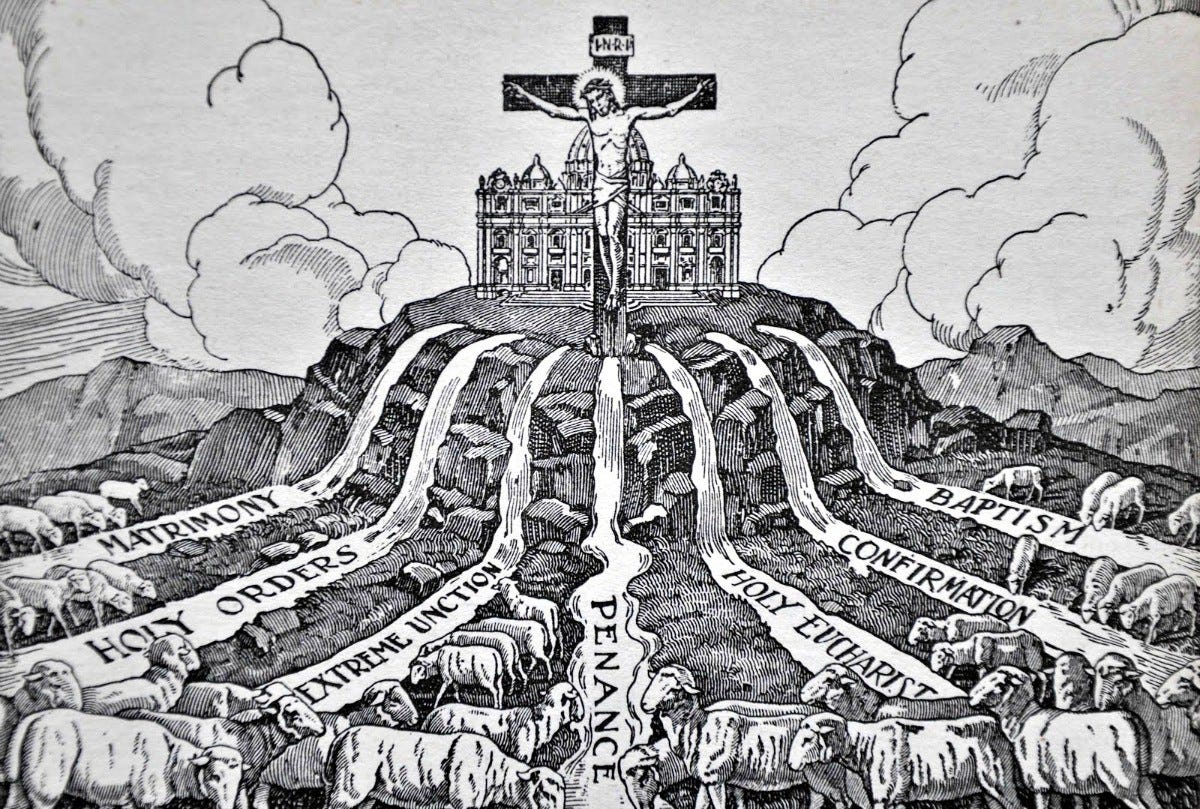
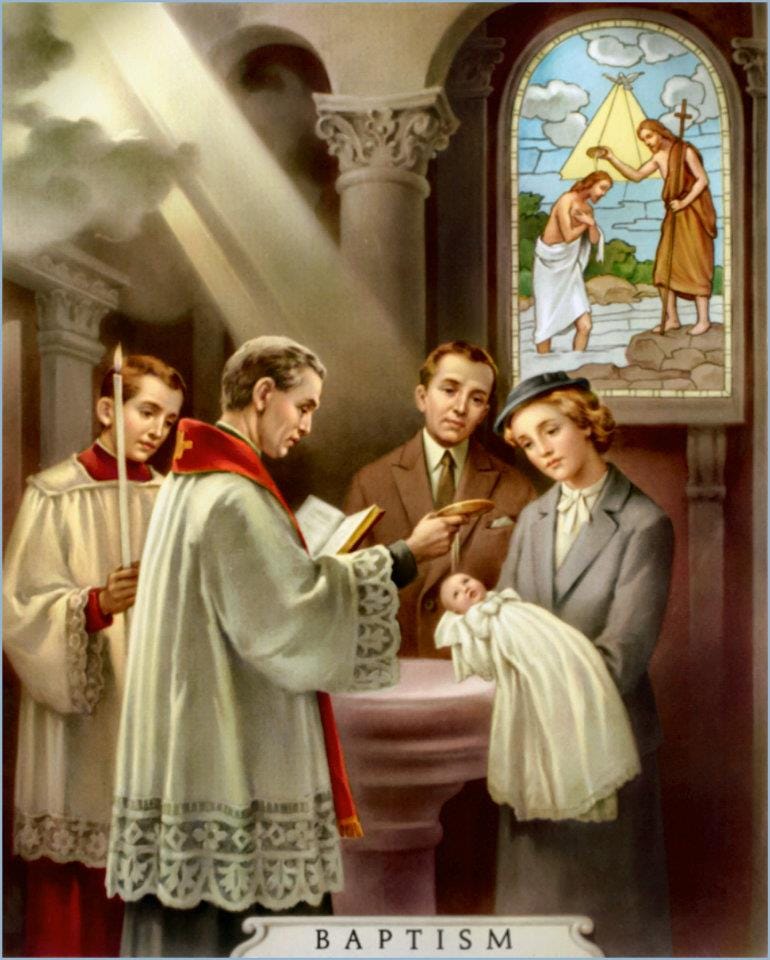
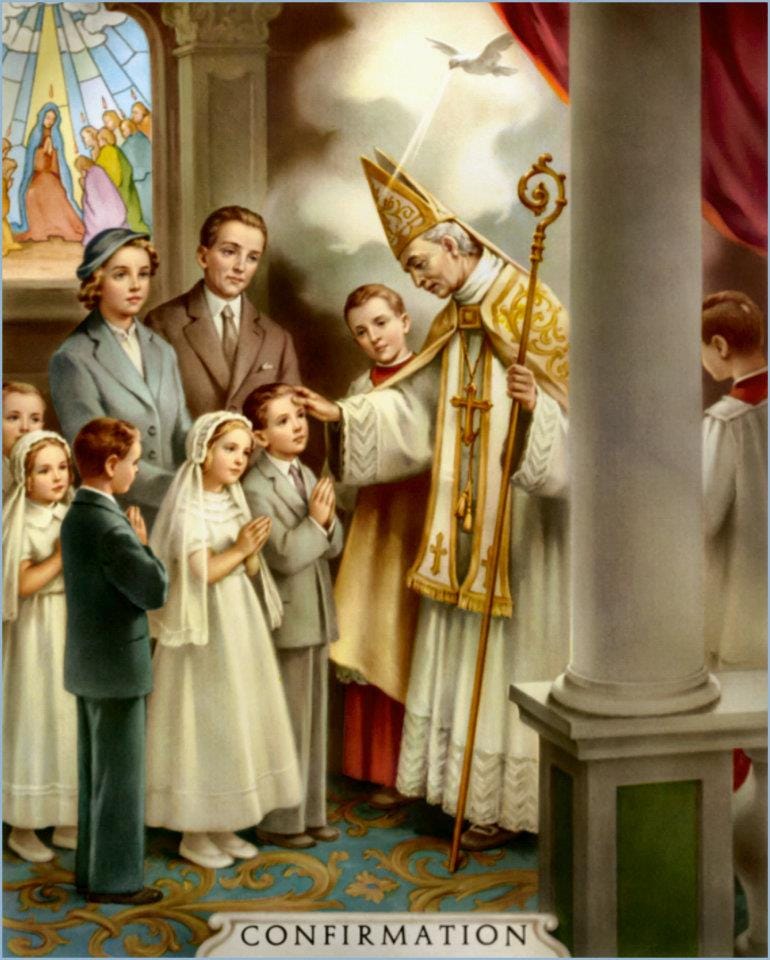
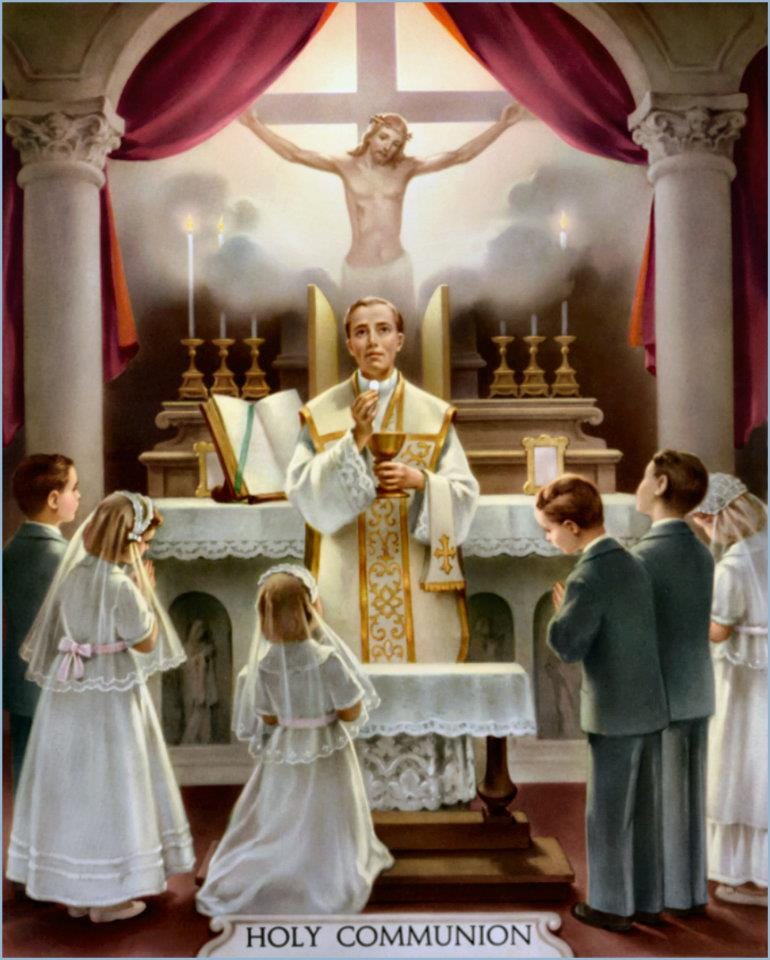
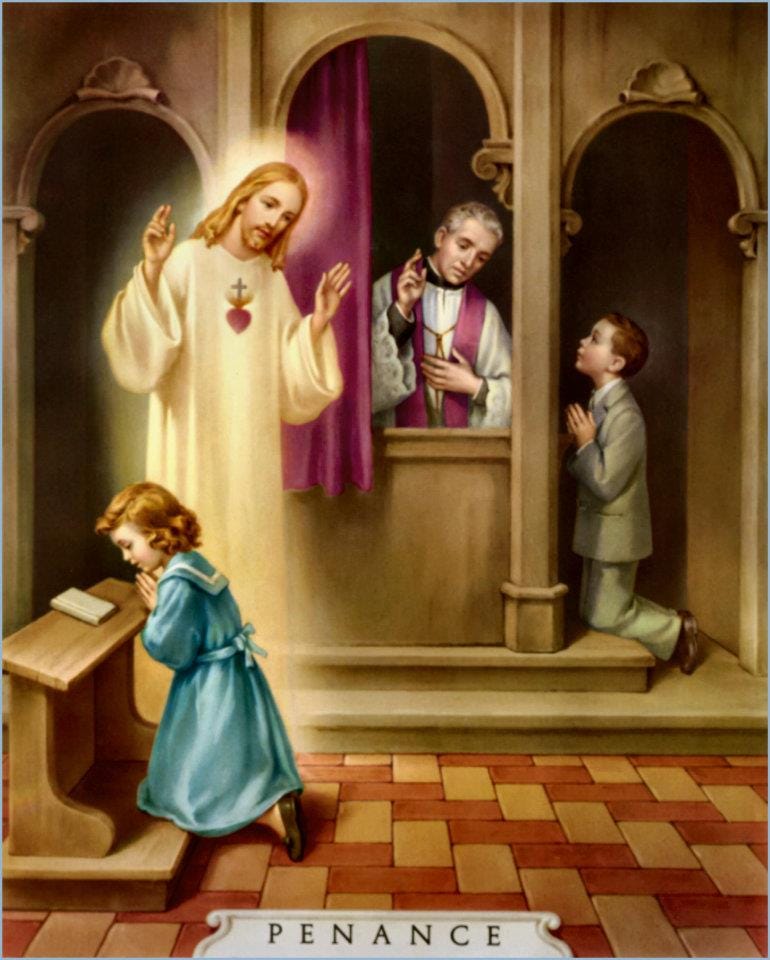
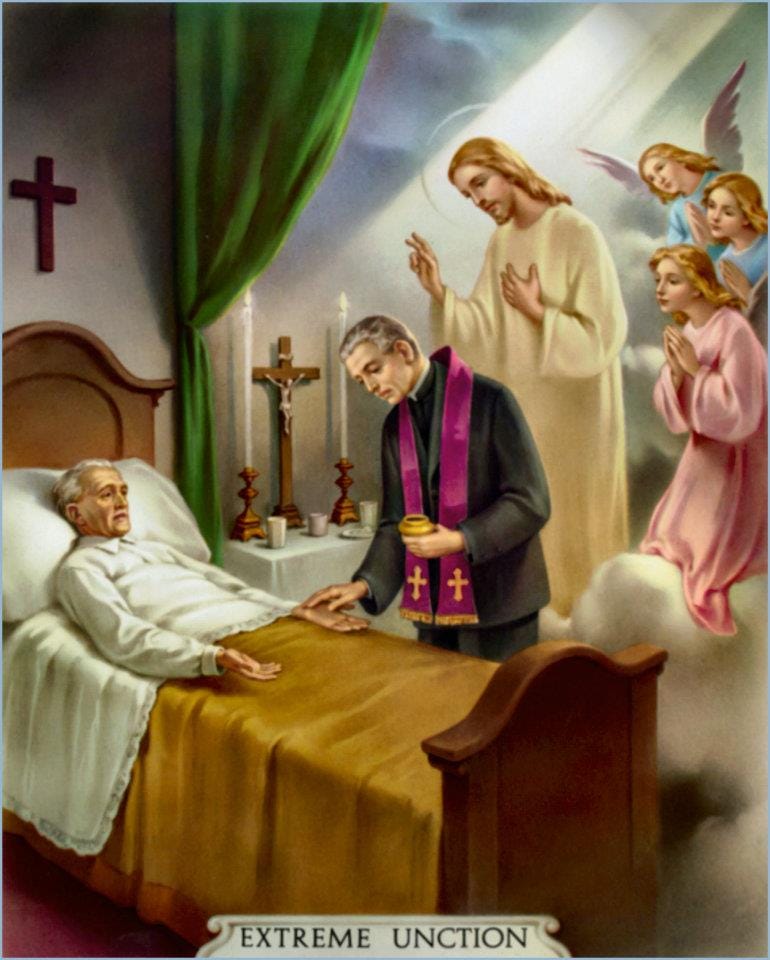
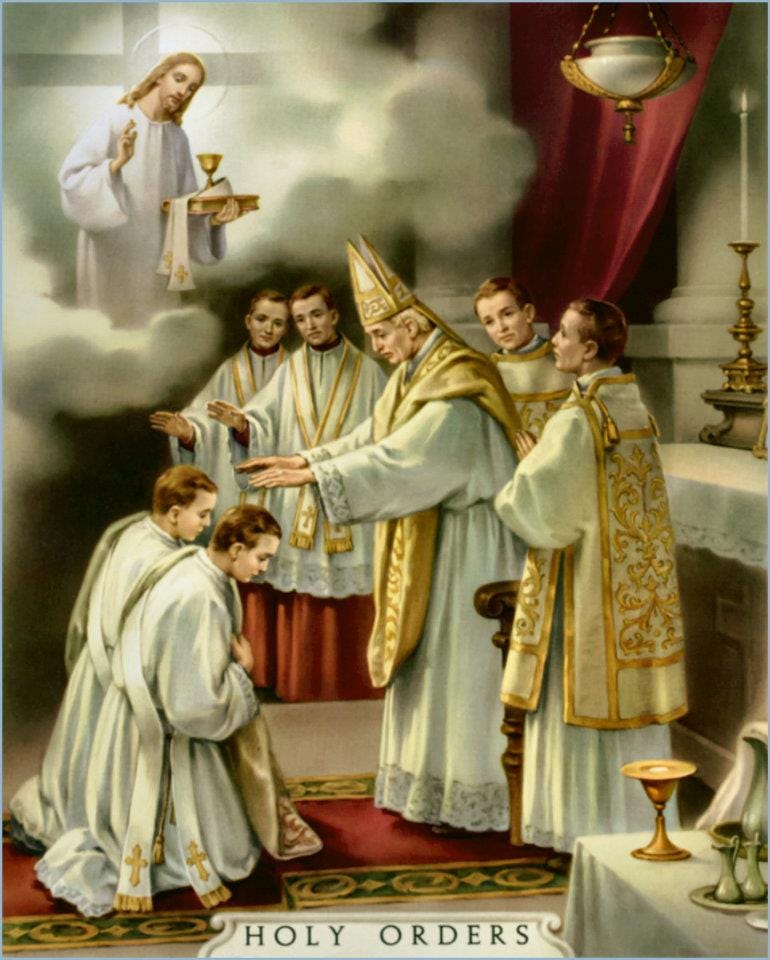
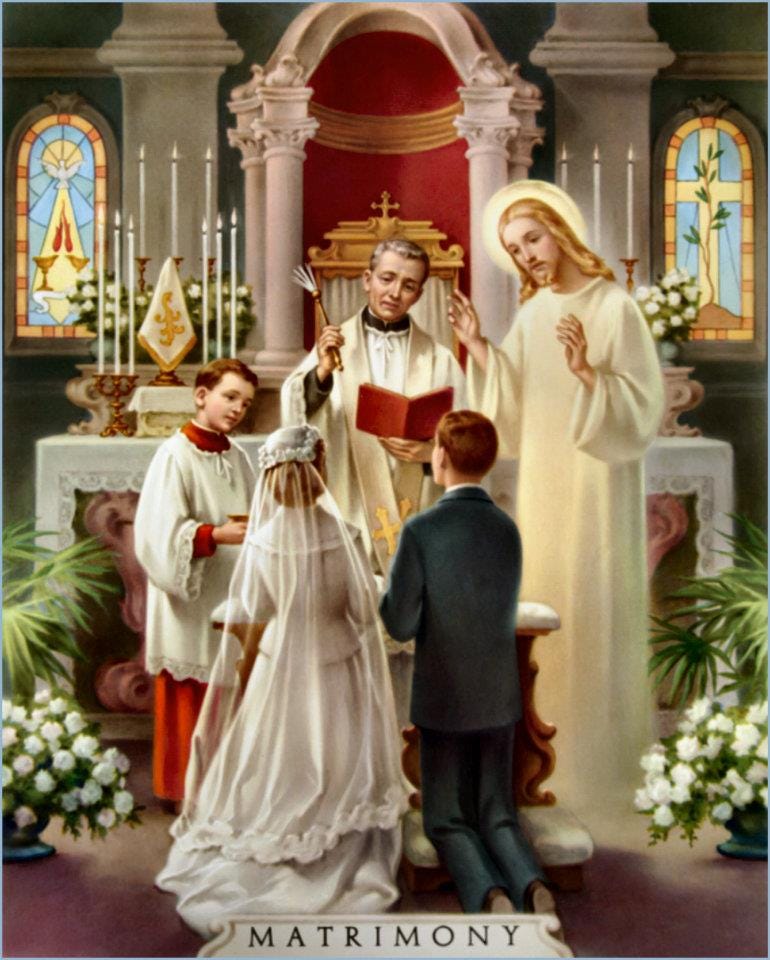
Your church sounds very similar to the one I joined years ago. We also take the Sacrament every Sunday to renew our covenants with God.
My marriage disaster tale was even more devastating. No do overs for me.